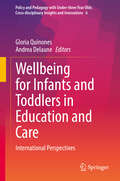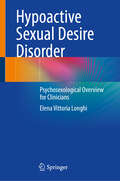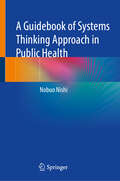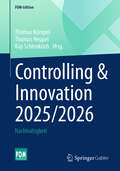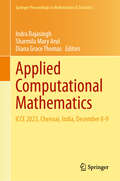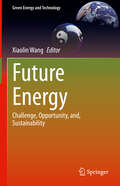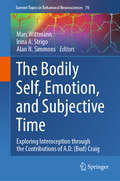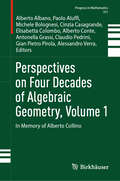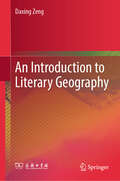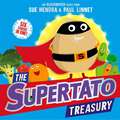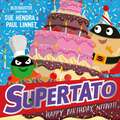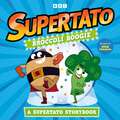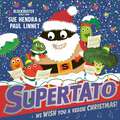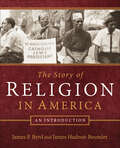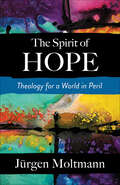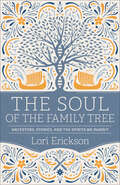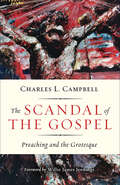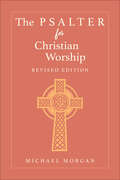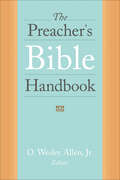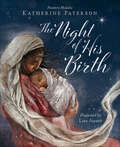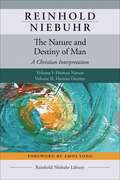- Table View
- List View
Wellbeing for Infants and Toddlers in Education and Care: International Perspectives (Policy and Pedagogy with Under-three Year Olds: Cross-disciplinary Insights and Innovations #6)
by Gloria Quinones Andrea DelauneThis collection explores key issues related to infant and toddler wellbeing, offering diverse international perspectives on how wellbeing is culturally understood. Scholars from Drawing from Australia, Aotearoa (New Zealand), Brazil, Greece, Norway, Portugal and the UK present local conceptualizations that contribute to a broader, global understanding of wellbeing. The international contributors examine wellbeing as a crucial construct, emphasising the importance of relationships, health, emotions, imagination, and professional practice in infant-toddler education. Their research covers various topics, including transitions, peer relationships, love, interactions with objects and environments, conceptualisations of time, pedagogical weaving, Indigenous knowledge, and intra-connectedness. This book highlights the significance of relationships—between people, places, objects, and time—in shaping wellbeing. It challenges readers to reconsider wellbeing as both central to pedagogy and deeply interconnected with humans, non-humans, and vibrant environments. Drawing on diverse theoretical frameworks and research projects, the collection offers rich, multifaceted insights into wellbeing across varied contexts.
Hypoactive Sexual Desire Disorder: Psychosexological Overview for Clinicians
by Elena Vittoria LonghiThis book provides a thorough review of scientific research on sexual desire disorders. Offering a comprehensive overview, it delves into the pathological, social, and relational factors influencing various manifestations of these disorders. This book aims to illuminate the complexities of Hypoactive Sexual Desire Disorder (HSDD) and broaden the understanding of its variants, including hypersexuality, asexuality, and reluctance to manage sexual desire. Endocrinologists, gynecologists, and andrologists will benefit from this book which integrates cutting-edge research with practical clinical insights, providing readers with an overview needed to improve their confidence and compassion in navigating and managing the multifaceted nature of sexual desire disorders.
A Guidebook of Systems Thinking Approach in Public Health
by Nobuo NishiThis book provides a comprehensive introduction to systems thinking in public health, offering readers a robust framework for understanding and addressing complex health issues. Through this book, readers will learn how to apply System Dynamics (SD) to model and analyze the interrelationships and feedback loops among various social determinants of health. The chapters cover essential topics such as causal loop diagrams, stock and flow diagrams, and systems archetypes. Readers will explore practical applications of SD models in both communicable and non-communicable diseases, including the COVID-19 pandemic and cardiovascular disease prevention. Particular attention is given to how these models can be applied in real-world scenarios where traditional intervention studies may not be feasible or ethical. The author, experienced scholars in public health, present an expert analysis of these models, making the content highly accessible and engaging. A Guidebook of Systems Thinking Approach in Public Health is directed towards postgraduate students in public health programs but is also highly beneficial for educators, researchers, and policymakers. It serves as a core text for courses on systems thinking or as supplementary reading material. By mastering the concepts presented in this volume, readers will be well-equipped to tackle dynamic public health challenges using a systems approach. Researchers in the field of public health will find this book particularly useful for its comprehensive coverage of SD modeling techniques. It is also an excellent resource for anyone interested in understanding the complexities of public health issues through a systems perspective.
Controlling & Innovation 2025/2026: Nachhaltigkeit (FOM-Edition)
by Thomas Kümpel Thomas Heupel Kay SchlenkrichDieses Buch zeigt die aktuellen Entwicklungen und deren Auswirkungen auf das Controlling auf. Das Controlling als Informationslieferant im Rahmen des Planungs-, Steuerungs- und Kontrollprozesses muss auf diese Entwicklungen schnell und effizient reagieren. Dies gilt sowohl für das operative als auch für das strategische Controlling. Das Themenfeld der Nachhaltigkeit steht im Fokus der Betrachtung. Die unter dem Begriff der Nachhaltigkeit zusammengefassten Phänomene und Herausforderungen verändern unsere gesellschaftlichen, ökonomischen und biologischen Systeme und Strukturen in bisher nie dagewesener Weise. Für Controllerinnen und Controller, die unter dem Ansatz der Rationalitätssicherung zielgerichtetes Handeln fördern und steuern wollen, ist die Nachhaltigkeit damit vielleicht die größte Herausforderung, der sich das moderne Controlling bisher stellen muss. Damit steht das Controlling als Disziplin, die sich des Nachhaltigkeitsthemas annimmt, sicher nicht alleine da. Aber vielleicht ist es gerade das Verständnis von Controlling, das im Umgang mit diesen Herausforderungen eine Schlüsselrolle einnimmt. Die zielgerichtete, rationale und evidenzbasierte Vorgehensweise, der sich Controllerinnen und Controller verschrieben haben, ist keineswegs eine Garantie dafür, die aktuellen und noch vor uns liegenden Herausforderungen zu lösen. Aber es ist die einzige Vorgehensweise, die hierzu überhaupt in der Lage ist.
Applied Computational Mathematics: ICCE 2023, Chennai, India, December 8-9 (Springer Proceedings in Mathematics & Statistics #480)
by Indra Rajasingh Sharmila Mary Arul Diana Grace ThomasThis proceedings volume showcases high-quality original research papers presented at the International Conference on Computational Engineering (ICCE 2023), held in Chennai, India, from December 8-9, 2023 dedicated to advancing interdisciplinary research in the realm of mathematics and its pivotal role in Computer Engineering. Explore the dynamic field of Computational Engineering, where innovative computational techniques—such as computer simulations, mathematical modeling, and numerical analysis—are employed to tackle complex engineering challenges. By integrating principles from engineering, computer science, and applied mathematics, this collection illustrates how virtual prototypes enable engineers to analyze and optimize systems before physical testing, saving valuable time and resources. Featuring selected works from conference participants and outstanding contributions from external researchers, this book highlights the broad applications of Computational Engineering across civil, mechanical, aerospace, chemical, electrical engineering, and beyond. Dive into cutting-edge research that paves the way for future advancements in engineering practices.
Future Energy: Challenge, Opportunity, and, Sustainability (Green Energy and Technology)
by Xiaolin WangFuture Energy: Challenge, Opportunity, and Sustainability presents new advances and research results in the fields of theoretical, experimental, and practical sustainable energy engineering. The book’s chapters are based on selected research papers presented at the 2023 7th International Conference on Sustainable Energy Engineering (ICSEE 2023). Contributions cover case studies to explore and analyze technological advancements alongside practical applications to help readers better understand the relevant concepts and solutions necessary to achieve clean energy and sustainable development. The book brings together the latest developments in the emerging areas of intelligent power systems, green energy, and technology. It offers approaches to help engineers and researchers working in sustainable energy engineering technologies solve practical problems affecting their daily work.
The Bodily Self, Emotion, and Subjective Time: Exploring Interoception through the Contributions of A.D. (Bud) Craig (Current Topics in Behavioral Neurosciences #70)
by Marc Wittmann Irina A. Strigo Alan N. SimmonsThis book aims to provide a comprehensive exploration of the interplay between the bodily self, emotion, and subjective time perception, consciousness, as well as clinical implications with a primary focus on the groundbreaking work of A.D. (Bud) Craig. By delving into Craig's contributions to interoception and his insights into the sense of a time within the context of the bodily self, this volume offers an in-depth understanding of the neural and psychological mechanisms underlying these phenomena. This book seeks to bring together leading experts from various disciplines such as neurophysiology, medicine, cognitive neuroscience, psychology, and philosophy, who explore in their chapters specific aspects of (1) interoception, (2) emotions, (3) time perception, (4) consciousness, (5) mental health, and their intersections. The result is an invaluable resource for researchers, clinicians, and scholars interested in the embodiment of behavior and experience.
Perspectives on Four Decades of Algebraic Geometry, Volume 1: In Memory of Alberto Collino (Progress in Mathematics #351)
by Gian Pietro Pirola Alberto Conte Alessandro Verra Antonella Grassi Elisabetta Colombo Alberto Albano Paolo Aluffi Michele Bolognesi Cinzia Casagrande Claudio PedriniThe first of a two-part volume, this collection offers a unifying vision of algebraic geometry, exploring its evolution over the last four decades as well as state-of-the art research. With chapters written by established leaders in the field as well as younger researchers, readers will gain a wide-ranging perspective of the area. The volume also commemorates the significant talent and contributions of Alberto Collino, whose scientific accomplishments helped shape the themes and topics covered. Perspectives on Four Decades of Algebraic Geometry, Volume 1 will be a valuable resource for those interested in the ways algebraic geometry has expanded over the years and continues to grow. "Quadratic Counts of Twisted Cubics" is available open access under a Creative Commons Attribution 4.0 International License via link.springer.com.
An Introduction to Literary Geography
by Daxing ZengThis book, the first introductory work of Literary Geography Studies in China, justifies literary geography as a discipline running in parallel with literary theory, literary criticism, and literary history. Zeng argues that Literary Geography Studies is a subdiscipline of literary studies rather than an interdisciplinary field or a subfield of geography. Zeng believes that, in Literary Geography Studies, the theories and methodologies of geography are adopted to solve problems in literary studies rather than problems in geography. The book has, for the first time, set up a theoretical framework for Literary Geography Studies as a secondary discipline. It has consequently structured the disciplinary knowledge covering topics such as the research object, research methodology, geographical influence upon literary production, geographical distribution of writers, geographical space in literary works, literary landscapes, literary regionality, and critical literary geography. This framework will bean invaluable tool to future scholars of Literary Geography Studies as it provides a systematic and detailed overview of the field, something that is currently lacking in English-language publications. In addition, the book derives its philosophy from ancient Chinese culture and establishes an innovative theoretical framework for Literary Geography Studies based on abundant examples from ancient Chinese literature, thus making a significant contribution to the existing literary studies by increasing a geo-spatial understanding of ancient Chinese literature.
Bad Machinery Vol. 1: The Case of the Team Spirit (Bad Machinery #1)
by John AllisonShauna. Charlotte. Mildred. Three schoolgirl sleuths. Jack. Linton. Sonny. Three schoolboy investigators. Tackleford. One mid-sized city with a history of countless mysteries. Is there enough room at Griswalds Grammar School for two groups of kid detectives? There better be, because once these kids have set their sights on solving a mystery there's nothing that can derail them. Nothing, except maybe gossip, classwork, new football player cards, torment from siblings, or any number of childhood distractions.
The Supertato Treasury (Supertato)
by Sue Hendra Paul LinnetSix action-packed Supertato adventures in one super-powered treasury!Meet Supertato! The supermarket superhero who always has his eyes peeled for trouble! This treasury edition brings six of Supertato&’s most incredible adventures together in one bumper book, bursting with action and laughs.Join Supertato and his gang of veggie friends as they work together to defeat The Evil Pea in these six laugh-out-loud stories:SupertatoSupertato: Veggies AssembleSupertato: Run, Veggies, Run!Supertato: Evil Pea Rules Supertato: Veggies in the Valley of DoomSupertato: Carnival Catastro-Pea!Praise for Supertato:'Hilarious... One of the funniest picture books this year - read it and laugh out loud!' Creative Steps Magazine'Hendra introduces another very silly but irresistible creation in the grand tradition of Barry, Norman, Keith et al.' Bookseller
Supertato: A brand-new adventure in the blockbuster series! (Supertato #13)
by Sue Hendra Paul LinnetHappy Birthday, Nitwit! There's a party and you're invited in this latest adventure in the blockbuster series!Hap-pea birthday to you, Mashed potato and poo. Hap-pea birthday, dear NITWIT, Hap-pea birthday to you! It's night-time in the supermarket and the veggies are busy baking for a SUPER special someone's birthday. But can you guess who's going to try to ruin the surprise?! All is revealed in the explosively delicious new adventure in this beloved blockbuster series. SUPERTATO: now a major CBeebies TV series.Look out for these other SUPER adventures:Supertato Supertato: Veggies Assemble Supertato: Run, Veggies, Run Supertato: Evil Pea Rules! Supertato: Veggies in the Valley of Doom Supertato: Carnival Catastro-pea! Supertato: Bubbly Troubly! Supertato: Night of the Living Veg Supertato: The Great Eggscape! Supertato presents Jack and the Beanstalk Supertato: Mean Green Time Machine Supertato: Eviltato vs Superpea
Broccoli Boogie: As Seen on BBC CBeebies (Supertato)
by SupertatoPrepare for the ultimate dance party mission in this brilliant new storybook, based on the incredibly popular BBC CBeebies series, Supertato. It's party time in the supermarket – it's the Broccoli Boogie! The veggies all LOVE to dance . . . except for Supertato. Although he has super strength, super speed and super skills, he does NOT have super moves. But when Evil Pea takes over the dance party, it's up to Supertato to throw some wicked shapes and beat that pesky pea in an ultimate dance off. Can he save the Broccoli Boogie?!
Supertato: We Wish You a Veggie Christmas! (Supertato)
by Sue Hendra Paul LinnetIt's night-time in the supermarket and Supertato and the veggies are feeling festive in Santa's Grotto... But when the Evil Pea gets hold of a powerful shrinking machine and shrinks the veggies to the size of tiny Christmas baubles, will Christmas be CANCELLED?! Or will Santa's little helpers find a way to save the day? Find out in the brand-new, fabulously funny Christmassy adventure in this blockbusting series.Other Supertato adventures:Supertato Supertato: Veggies Assemble Supertato: Run, Veggies, Run Supertato: Evil Pea Rules Supertato: Veggies in the Valley of Doom Supertato: Carnival Catastro-pea Supertato: Bubbly Troubly Supertato: Night of the Living Veg Supertato: The Great Eggscape Supertato presents Jack and the Beanstalk Supertato: Mean Green Time Machine Supertato: Eviltato vs Superpea Supertato: Happy Birthday, Nitwit!
Arizona Off the Beaten Path®: Discover Your Fun (Off the Beaten Path Series)
by Roger NaylorTired of the same old tourist traps? Whether you&’re a visitor or a local looking for something different, Arizona Off the Beaten Path shows you the Grand Canyon State you never knew existed. Take a scenic drive on Schultz Pass Road for views of the San Francisco Peaks and ponderosa pine forestsEnjoy a spooky overnight stay at the Ghost City Inn Bed-and-BreakfastFeed a roadrunner out of the palm of your hand at Sabino CanyonSo if you&’ve &“been there, done that&” one too many times, get off the main road and venture Off the Beaten Path.
MORAN AGRICULTURE LEARNER'S BOOK GRADE 9
by David mbaabu, Francis Musungu, Susan kageni, Damaris ShihunduMoran Agriculture for Grade 9 is developed in line with the rationalised Curriculum Design for Agriculture, ensuring learners acquire essential skills and competencies through a logical and engaging approach. The book adopts a simple-to-complex presentation that sparks curiosity and promotes inquiry-based learning. Each sub-strand begins with a Get started section, linking new concepts to learners’ everyday experiences, followed by Think and share, which encourages critical thinking. The core Learning activities provide structured, hands-on experiences that cater to diverse learning styles and address all three domains of learning. At the end of each activity, the Learning corner helps learners confirm and reflect on their findings, while the Extended activity offers practical applications beyond the classroom. To foster self-assessment, the Self-check corner allows learners to gauge their progress, and the Revision exercise at the end of each sub-strand consolidates knowledge through comprehensive practice. Together, these features make the book a learner-centered resource that not only builds agricultural knowledge but also nurtures problem-solving, creativity, and lifelong learning.
